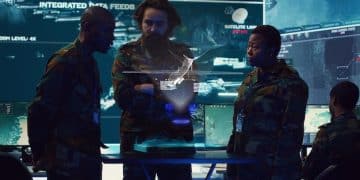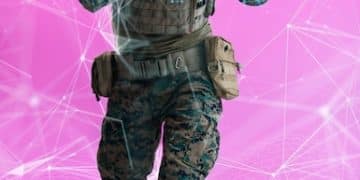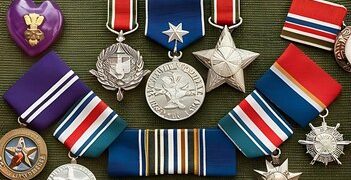Understanding the Code of Conduct: Ethics in Modern Warfare

Understanding the Code of Conduct: Ethics in Modern Warfare is critical because it governs military personnel’s behavior, ensuring lawful and ethical actions during conflict, and fostering accountability and professionalism.
The Understanding the Code of Conduct: Ethics in Modern Warfare is not just a set of rules; it’s the moral backbone that guides military personnel through the complexities of armed conflict, ensuring actions align with legal and ethical standards. It’s about making the right choices when faced with impossible situations.
What is the Code of Conduct in Modern Warfare?
The Code of Conduct in modern warfare is a moral and ethical guide designed to help military personnel act appropriately in combat situations. Understanding its principles ensures that soldiers adhere to international laws and maintain the highest standards of integrity.
It’s not simply about avoiding legal repercussions; it’s about upholding values, protecting civilians, and ensuring that military operations are conducted with honor and professionalism.
Origins and Evolution
The Code of Conduct has evolved significantly over time, adapting to new technologies and changing warfare tactics. Initially focused on prisoner of war scenarios, it now addresses a broader range of ethical dilemmas faced in modern conflicts.
Key Principles
- Obey lawful orders and regulations.
- Take responsibility for your actions.
- Protect non-combatants and civilians.
- Treat all prisoners of war with respect.
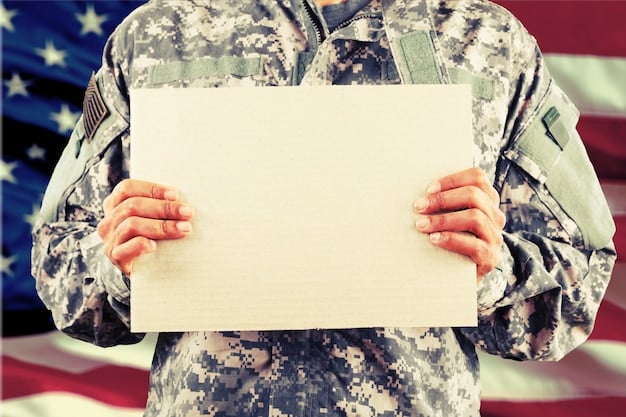
These principles are fundamental to maintaining discipline and ensuring that military actions are morally justifiable. They provide a framework for decision-making in complex and high-pressure environments.
In conclusion, the Code of Conduct is a vital tool for guiding military personnel through the ethical challenges of modern warfare, emphasizing the importance of lawful and morally sound conduct. It is a constantly evolving document that reflects the changing nature of conflict and the need for ethical decision-making.
The Role of Ethics in Military Operations
Ethics play a crucial role in shaping the conduct of military operations. Ethical considerations guide decision-making at all levels, from strategic planning to tactical execution on the ground.
A focus on ethics ensures that military actions are not only effective but also morally justifiable, promoting accountability and minimizing harm to non-combatants.
Ethical Decision-Making
Military leaders must make difficult decisions that balance operational objectives with ethical considerations. This involves assessing the potential impact of actions on civilians, infrastructure, and the environment.
Balancing Objectives and Ethics
- Prioritize minimizing civilian casualties.
- Adhere to the principles of proportionality and military necessity.
- Ensure troops are well-trained in ethical decision-making.
Striking a balance between achieving military objectives and upholding ethical standards requires careful planning, thorough risk assessment, and a commitment to accountability. Ethical decision-making is not just a legal obligation; it’s a moral imperative.
Ultimately, the integration of ethics into military operations is essential for maintaining public trust and ensuring that military actions are aligned with fundamental human values.
Challenges to Ethical Conduct in Modern Warfare
Modern warfare presents numerous challenges to ethical conduct, including asymmetrical conflicts, technological advancements, and the blurring lines between combatants and civilians. Navigating these complexities requires robust ethical frameworks and ongoing training.
It’s not easy but acknowledging these challenges is the first step toward developing strategies to mitigate ethical breaches and uphold the principles of the Code of Conduct.
Asymmetrical Warfare
In asymmetrical conflicts, where adversaries may not adhere to the same rules of engagement, it can be tempting to abandon ethical standards. However, maintaining the moral high ground is crucial for long-term success.
Technological Advancements
- Autonomous weapons systems raise questions about accountability.
- Cyber warfare poses challenges to traditional notions of sovereignty and proportionality.
- Drones can blur the lines between surveillance and targeted killings.
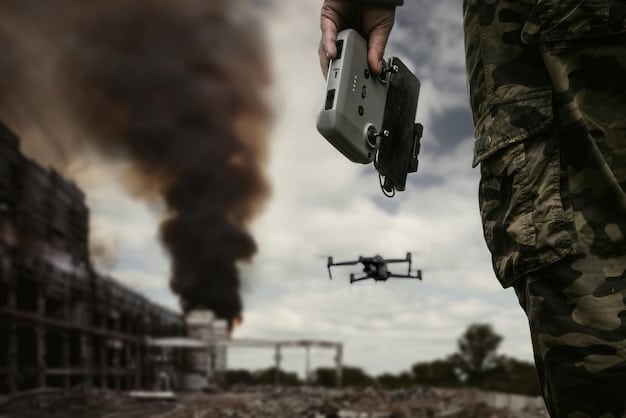
These technological advancements require careful consideration of their ethical implications to ensure that they are used responsibly and in accordance with international law.
In conclusion, addressing these challenges requires ongoing dialogue, education, and a commitment to upholding ethical standards in the face of evolving warfare tactics and technologies.
Training and Education on Ethical Conduct
Training and education play a vital role in promoting ethical conduct among military personnel. Comprehensive programs ensure that soldiers understand ethical principles, can recognize ethical dilemmas, and are equipped to make sound decisions under pressure.
Ethical training should be an ongoing process, integrated into all levels of military education and professional development.
Curriculum Development
Ethical training programs should cover a range of topics, including the Code of Conduct, international law, human rights, and moral decision-making frameworks.
Effective Methods
- Case studies provide practical examples of ethical dilemmas.
- Role-playing exercises help soldiers develop decision-making skills.
- Discussions encourage critical thinking and reflection.
These methods help to create a learning environment where soldiers can explore ethical issues, share perspectives, and develop a strong moral compass. Effective training extends beyond memorizing rules; it fosters a deep understanding of ethical principles.
Ultimately, investing in comprehensive training and education is essential for building a military culture that prioritizes ethical conduct and promotes responsible decision-making.
Legal Frameworks Supporting Ethical Warfare
Legal frameworks provide a foundation for ethical warfare by establishing rules and standards that govern military conduct. These frameworks include international treaties, conventions, and domestic laws that aim to protect civilians, prevent war crimes, and ensure accountability.
Understanding and adhering to these legal frameworks is essential for maintaining the legitimacy and credibility of military operations.
International Humanitarian Law
International Humanitarian Law (IHL) is a set of rules that seek to limit the effects of armed conflict by protecting persons who are not participating in hostilities and by restricting the means and methods of warfare.
Key Legal Principles
- Distinction: Differentiating between combatants and civilians.
- Proportionality: Ensuring that military actions are proportionate to the military advantage.
- Necessity: Using only the force necessary to achieve a legitimate military objective.
These principles are enshrined in treaties such as the Geneva Conventions and are binding on all parties to an armed conflict. Compliance with IHL is not optional; it’s a legal obligation. The principles reflect a shared commitment to upholding human dignity even in times of war.
In conclusion, robust legal frameworks are essential for guiding military conduct and ensuring that warfare is conducted in accordance with ethical and legal standards. These frameworks provide a basis for accountability and help to prevent the worst excesses of armed conflict.
The Future of Ethics in Military Culture
The future of ethics in military culture depends on a continued commitment to promoting ethical leadership, fostering a culture of accountability, and adapting to the evolving challenges of modern warfare.
As technology advances and new forms of conflict emerge, it’s more important than ever to ensure that ethical considerations remain at the forefront of military decision-making.
Leadership and Culture
Ethical leadership is essential for setting the tone and creating a culture where ethical conduct is valued and rewarded. Leaders must model ethical behavior, promote open communication, and hold subordinates accountable for their actions.
Strategies for the Future
- Emphasize ethical decision-making in officer training programs.
- Promote dialogue and reflection on ethical issues within the military community.
- Strengthen mechanisms for reporting and investigating ethical breaches.
These strategies can help to reinforce ethical principles and create a military culture that is resilient in the face of adversity. Building a strong ethical foundation requires a holistic approach that encompasses leadership, training, and accountability.
In conclusion, the future of ethics in military culture depends on a sustained commitment to ethical leadership, a culture of accountability, and ongoing adaptation to the challenges of modern warfare. By prioritizing ethics, the military can ensure that it remains a force for good in the world.
| Key Aspect | Brief Description |
|---|---|
| 🛡️ Ethical Conduct | Ensures military actions adhere to laws and values, promoting accountability. |
| ⚖️ Legal Frameworks | Provides rules and standards to govern military behavior, protecting civilians. |
| 📚 Training & Education | Equips soldiers with the knowledge to make ethical decisions under pressure. |
| 🌐 IHL Compliance | Adherence to International Humanitarian Law minimizes the impact of conflict. |
Frequently Asked Questions
▼
The primary purpose is to guide military personnel in ethical decision-making during armed conflicts, ensuring actions align with legal standards and protect civilians.
▼
IHL establishes rules and standards protecting non-combatants and restricting the methods of warfare, thereby providing a legal foundation for ethical conduct.
▼
Training equips soldiers with the knowledge to identify ethical dilemmas and make responsible decisions under pressure, fostering a culture of accountability.
▼
Challenges include asymmetrical conflicts, technological advancements like AI, and the difficulty in distinguishing between combatants and civilians in complex environments.
▼
Leaders must model ethical behavior, encourage open discussion on ethical dilemmas, and hold subordinates accountable for adhering to the Code of Conduct and legal standards.
Conclusion
In summary, Understanding the Code of Conduct: Ethics in Modern Warfare is essential for upholding moral and legal standards, protecting civilians, and maintaining the integrity of military operations. Continuous training, ethical leadership, and adherence to international law are vital for navigating the complexities of modern warfare and ensuring actions align with fundamental human values.

